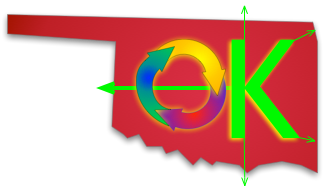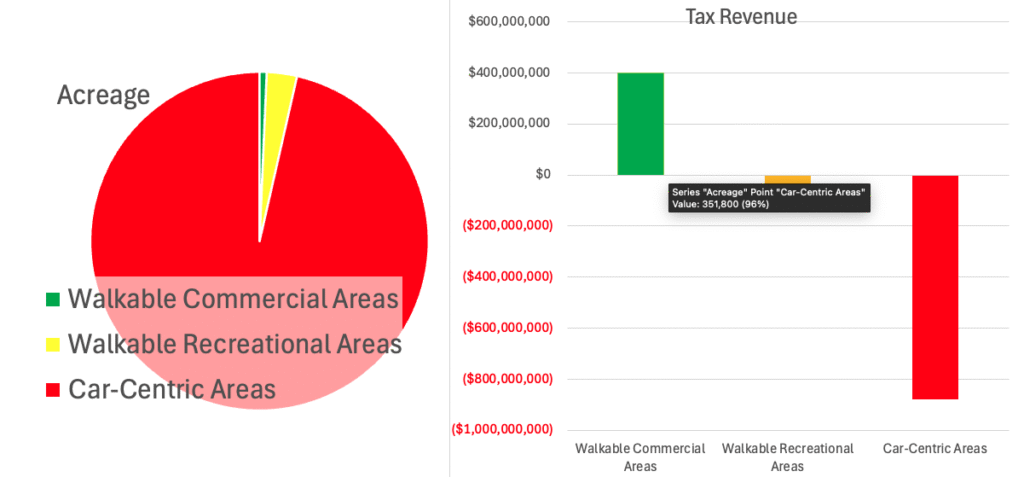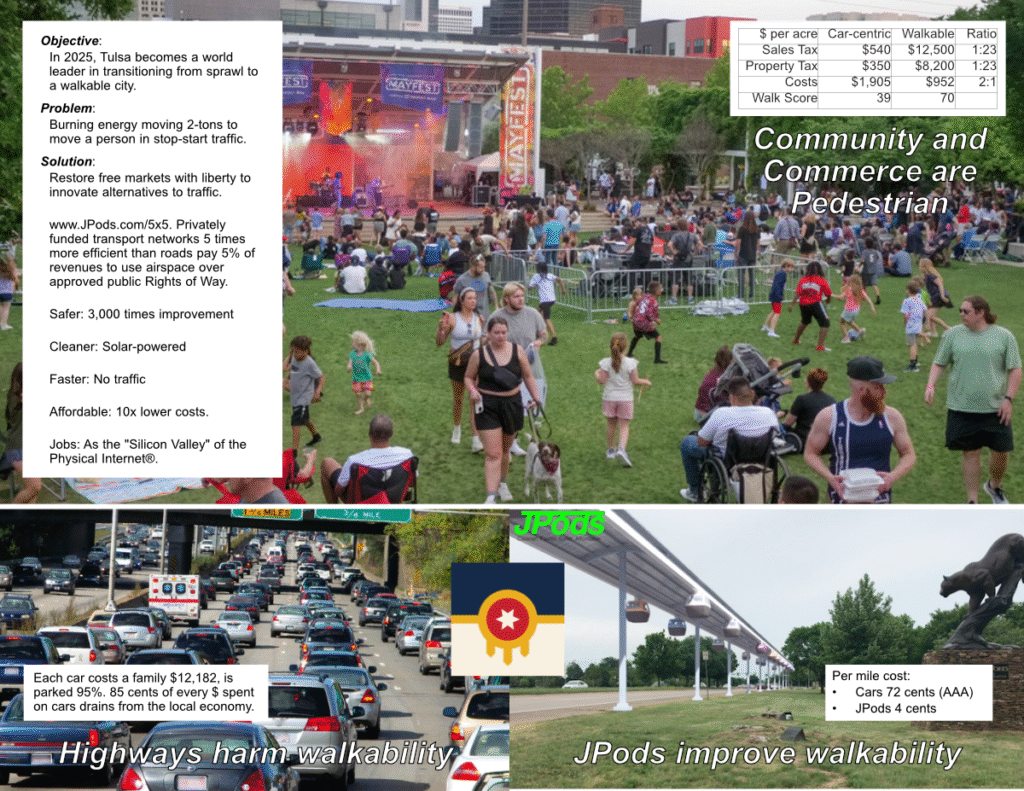Tulsa City Council Presentations
Walkscore
Downtown Tulsa ( 73) and 61st & Harvard (18) Commerce and community are pedestian. Bikes can replace cars once podcar networks remove enough cars to make walking and biking safe.
Governments: Have 3 times the lane-miles of roads than they can afford to maintain
Link to framework to run independent ai assessments.
| Category (gemini, grok, & perplexity) | Walk Score | Acreage | % of County Land | Property Tax/acre | Sales Tax/acre | Total Tax/acre | Service Cost/acre | Net Fiscal/acre | Net |
| Walkable Commercial Areas | 75 | 2,500 | 0.70% | $25,500 | $150,000 | $175,500 | $15,000 | $160,500 | $401,250,000 |
| Walkable Recreational Areas | 60 | 10,500 | 2.90% | $150 | $0 | $150 | $3,500 | -$3,350 | -$35,175,000 |
| Car-Centric Areas | 35 | 351,800 | 96.40% | $1,500 | $2,500 | $4,000 | $6,500 | -$2,500 | -$879,500,000 |
People: 60% cannot afford cars mandated by infrastructure policies
- Newsweek: Americans Can No Longer Afford Their Cars
- MarketWatch: People could barely afford their cars even before Trump’s auto tariffs. It’s about to get worse.
- CarScoops: Owning A New Car Becoming A Fantasy For Millions Of Americans
JPods Mesh Network™ in Tulsa will double Walk Score
- Downtown, Cherry Street, and Brookside Walk Score is 70-90.
- Suburbs and rural Walk Score is <30.
- JPods wants to privately fund a $6.9 billion solar-powered mesh network to double the Walk Score in most of Tulsa County. AI assessment of the cost and paybacks for this JPods investment in Tulsa. Here is a link to the model used, so you may adjust the parameters.
Image of an example Mesh Network™. Mesh Networks are simulated with JPods Route Time™ software. You may download this software for free to build your own simulations (note, maps are only available during evenings).
Travel times are calculated staring at the RED Cross (center of Green clusters). Stations are and the center of each circle. Green is for 5 minutes, Blue is for 10 minutes, Yellow is 20 minutes, Red is 30 minutes (walk/bike to a station, ride to another station, and walk/bike from that station).
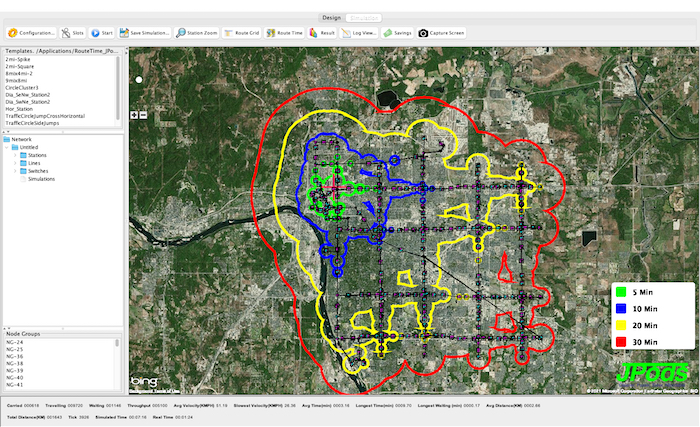
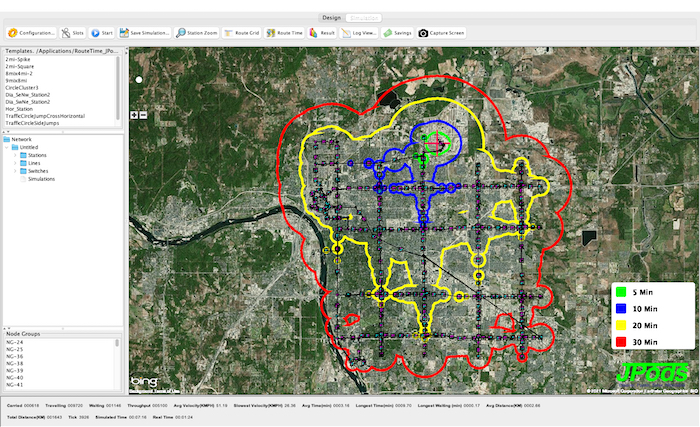
Video of JPods Route Time simulation of a network in Tulsa.
For half a century we have known PRT networks like JPods are the solution to traffic
Morgantown PRT, grade-separated networks of self-driving cars have been operating since 1972.
JPods US Patent improves on the Morgantown PRT in two important ways (6,810,817):
- Robots replace the central computer control system: “A method of controlling a transportation System for moving people, freight, and any combination whereof using a distributed network of intelligent devices without requiring the aid of a human driver”
- Networks are solar-powered: “The method… providing… Solar and wind power generators integrated into the physical Structure of Said transportation System….”
Tulsa and Oklahoma can become the commercial center for the Physical Internet®
- Traffic costs Americans $2.76 trillion and weeks sitting in traff each year. Everyone hates traffic.
- Relative to the 470 ton-mpg efficiency of freight railroads, this is 188 times more efficient than moving a ton to move a person with the 25 mpg efficiency of a Model-T on highways.
- Podcar, Personal Rapid Transit, or PRT network are 10-20 times more efficient than highways.
- Podcar networks are personal, on-demand, 24x7. No waiting for the bus. No risks of riding with strangers.
- On-demand mobility regardless of age, ability or wealth. Cars/highways provide only 60% of Americans with this liberty to go where they wish, when they wish, to profit from the Division of Labor or the Pursuit of Happiness.
- Adopt 5x5solar to restore free markets.
- Transport networks 5 times more efficient than roads pay 5% of gross transport revenues to use airspace over public Rights of Way to deploy Mobility As A Service networks.
- Safety is improved 3,000 times.
- End unconstitutional highway and mass transit monopolies. Enforce the Oklahoma Constitution: "Article II, Bill of Rights, SECTION II-32. "Perpetuities and monopolies are contrary to the genius of a free government, and shall never be allowed, nor shall the law of primogeniture or entailments ever be in force in this State."
- Builds on the success of the Morgantown PRT.
- Congressional Study on PRT as the solution to traffic and hardships of the 1973 Oil Embargo.
- New Jersey law and study on how PRT networks can solve NJ traffic.

- News on podcar industry
- Investment by Bill Gates in Glydways. Gates comment: “When it happens, AVs will change transportation as dramatically as the PC [personal computer] changed office work.”
- Sugarland, TX
- Become a commercial cluster for this industy. JPods will invite our competitors to also build in Tulsa.
- Link to North Central Texas Coalition of Governments vote supporting the deployment of JPods networks in DFW.
- Competition from Texas
- Competition from Georgia
- The end of affordable oil.
- Dallas Fed forecasts a replay of 2008 oil prices this decade.
JPods Networks in Oklahoma
- JPods privately funds a solar-power transport network for people and cargo in Tulsa.
- 90 second summary video
- Initial leg, 10.5 miles, 16.8 km, a $200 million investment in Tulsa.
- Mesh network to make Tulsa as walkable as NYC or Paris, making cars optional for most.
- Jobs: FHWA estimates 13,000 job-years per billion.
- Put oil service companies to work building guideway networks.
- Commerce is pedestrian.
- Only 1.2% of land area in the 35 largest US cities are walkable land and generate 20% of GDP.
- Sprawl harms families:
- Car costs a family about $12,182, is parked 95% of the time with ~85% of car costs leaving the local economy. 2.24 cars per household (278.06 million cars.
- Study: How Car Ownership is Keeping Americans From Financial Stability
- Newsweek: “Americans needed an annual income of at least $100,000 to afford a car. That means that more than 60 percent of American households currently cannot afford to buy a new car. For individuals, the numbers are even worse, with 82 percent of people below the $100,000 line”
- How Forgiving design in roads kills pedestrians
- Community is pedestrian:
- In 1974, nearly a third of Americans reported spending time with their neighbors at least twice a week. Forty years later, that number had been cut in half. Over the same period of time, the number of Americans reporting zero interactions with their neighbors has grown from 20% to almost 35%
- Racist outcomes, Federal highway construction replaced Jim Crow.
- Health is pedestrian:
Mesh networks makes cars optional:
Mesh network for Tulsa and link to ai assessment of the benefits. Framework to run your own assessments.
- "Y" Oklahoma
- Admiral, Tulsa
- Peoria Ave, Tulsa
- Riverside, Tulsa
- Airport, Tulsa
- OKC
- Cities outside OK
- Book, Climate Change Root Cause, Unconstitutional Federal Highways Making Unwalkable Cities
Walkable Tulsa subsidizes Car-Centric Tulsa
Tulsa County Land Use and Tax Revenue per Acre (FY 2023–2024)
| Category | Estimated Acreage | Property Tax/acre | Sales Tax/acre | Total Tax/acre | Est. Public Service Cost/acre | Net Revenue/acre |
|---|---|---|---|---|---|---|
| Walkable Commercial | ~2,000 acres | $421,870 | $25,891 | $447,761 | ~$30,000–50,000 | $400,000+ |
| Walkable Recreational | ~8,174 acres | $12,600 | $773 | $13,373 | ~$5,000–15,000 | -$2,000 to +$8,000 |
| Car-Centric | ~365,506 acres | $2,534 | $155 | $2,689 | ~$7,000–12,000 | -$4,000 to -$9,000 |
| Countywide Average | 375,680 acres | ~$2,803 | ~$165 | $2,968 | ~See above | ~Negative average |
Data request from the City but not obtained. Data provided is from two efforts using ChatGPT and Perplexity. They are not the same, but have the same general data that "walkable" Tulsa is solvent and "car-centric" Tulsa is a financial disaster.
Barrier to Innovation
As documented in Congressional study "Automated Guideway Transit" the only barrier for "four to six decades" to transportation innovation is Federal regulations. Federal regulations resulted in a century of rotary telephones and the 25 mpg efficiency of the Model-T. Restoring communications to free markets in 1982 resulted in the millions of jobs digitizing mobility. Restoring soon as free markets are restored to transportation
JPods Patent
JPods improves on the Morgantown PRT by removing the need for a central computer. JPods are a network of distributed collaborative computers (robots) moving physical packets, the Physical Internet®.
JPods vehicles, like the personal car, are designed to carry 1 to 6 people. This makes JPods infrastructure light and inexpensive. The small packet size means many more stations and trips that tailor the trip to the traveler. JPods small size allows many different pods tailored to many different uses. There are pods for passengers, cargo, water, etc....
Three-minute summary of JPods.
Why Suspended?
Suspended networks are well understood with incredible safety records.
- The suspended train in Wuppertal, Germany moves 25 million passengers/year with one fatal accident since it opened in 1901. They are safe, but noisy and lack JPods' ability to personalize each trip to the needs of the traveler.
- The H-Bahn is a great idea, but the packet size is still too large with heavy infrastructure and few stations. Humans do not typically travel in groups of 50 to 100. We travel by ourselves and with our family. The packet size should match the need for the travelers.
- Many modern rollercoasters are suspended to provide safety and intensity. Thrill rides have a safety 10,000 times better than DOT, with 0.9 injuries per million versus DOT with 11,200.
Vote by North Central Texas Coalition of Governments, breaking "institutional failures"
Three Phases to minimize risk to city and ramp crews and manufacturing base:
- Kitty Hawk Network. This is an approximately 170 meter network that will be certified to Texas standards.
- Expand the network at Houston airport.
- Expand a mesh network to make Houston make highways optional.
Route-Time™ map showing travel times in Houston, 24x7. From the Red Cross, where you can walk to a station, ride to another station, and walk from that station is noted by the circles around each station. Green is 5 minutes, Blue is 10 minutes, Yellow is 20 minutes, and Red is 30 minutes.
Required Action:
- Use known and highly effective exiting regulation:
- Rights of way based on existing laws for communications and power networks.
- The Franchise Agreement is adapted from the franchise agreements used by cities for communications and power networks. For capital to invest cities must make known regulatory costs and delays. This agreement is fundable and based on well used practics put in place since The Communications Act of 1934 established a uniform maximum of 5% for use of public Rights of Way.
- The 5X5 Standard MOU is a one-page summary of the Franchise Agreement. It makes it easy for non-technical people to grasp the regulatory requirements and for JPods to risk our capital to begin efforts.
- To create the jobs, train crews, build the manufacturing base, and deploy networks to meet a need in 2026 is an enormous task that must be started immediately to be effective by 2026.
Key features of the JPods networks:
- Cleaner, 100% solar-powered. Support walking and biking.
- Faster. Non-stop from origin to destination is quicker that cars most of the time. 24x7 availability eliminates waiting for Mass Transit.
- Safer. Grade-separated preempt crashes. Compliance with theme park standards requires a 3,000 times safety improvement. Preempt risks of crimes by not riding with strangers or waiting at bus stops.
- Affordable. Equity provided by on-demand mobility regardless of age, ability, or wealth.
- Car costs a family about $12,182, is parked 95% of the time with ~85% of car costs leaving the local economy. 2.24 cars per household (278.06 million cars.
- No cost of deployment or operation carried by the tax payers. JPods networks are privately funded, 5X5 Standard.
- New source of revenue for governments from the 5% of gross transportation revenues paid for non-exclusive used of airspace over public Rights of Way.
Features to for foreign visitors:
- Service in people's native own language:
- Your phone app and/or the on-board computer is your interface, in your own language.
- Phone and computer support is available in your own language.
- Ability to pay through your phone in your own currency.
- Eliminating risks of travel during celebrations from distraction or impairment.
Features for very large events such as the 2026 World Cup:
- Mass of vehicles is known. So explosives cannot be hidden by the mass of a truck.
- Camera monitor risky situations.
- Vehicles can be re-routed to a secure area if there is an appropriate cause for concern.
- False-risk events cause those affected minimum unhappiness.
- Sensor can monitor for dangerous substances.
- Capacity can surge to accommodate extraordinary demand.
JPods Experience:
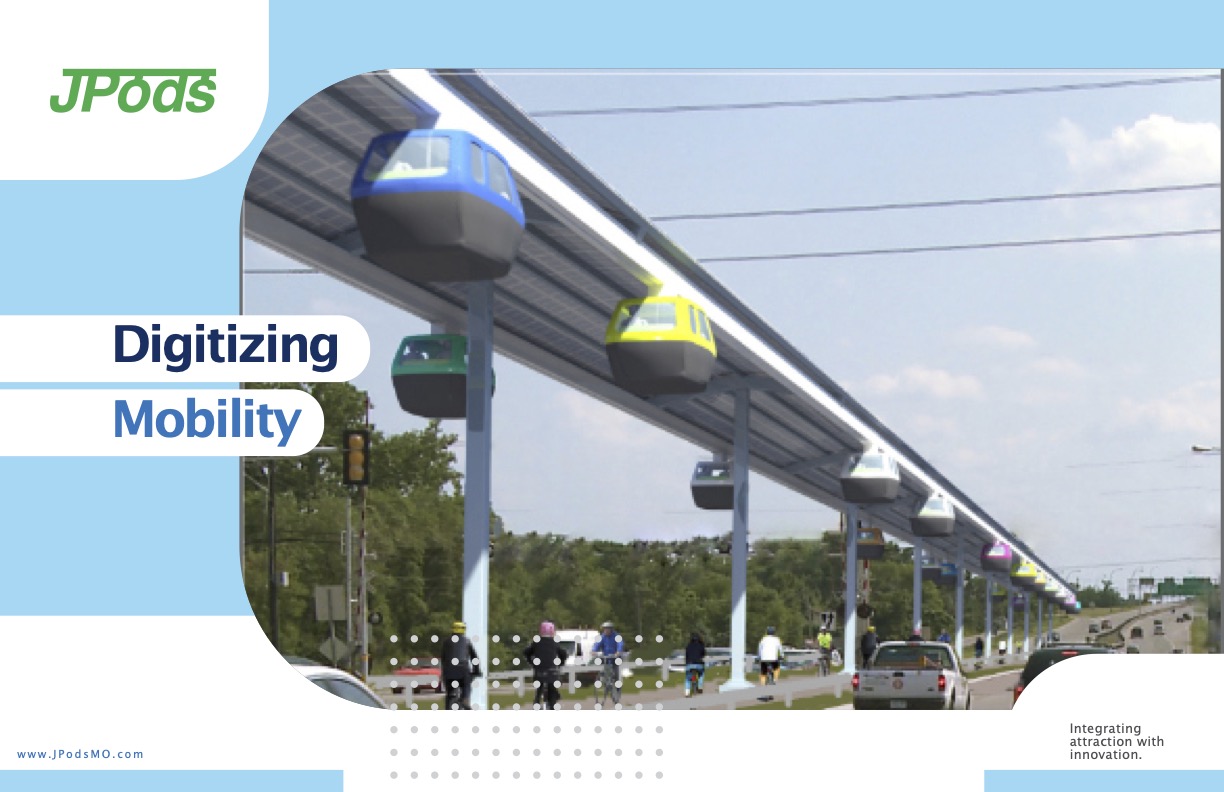
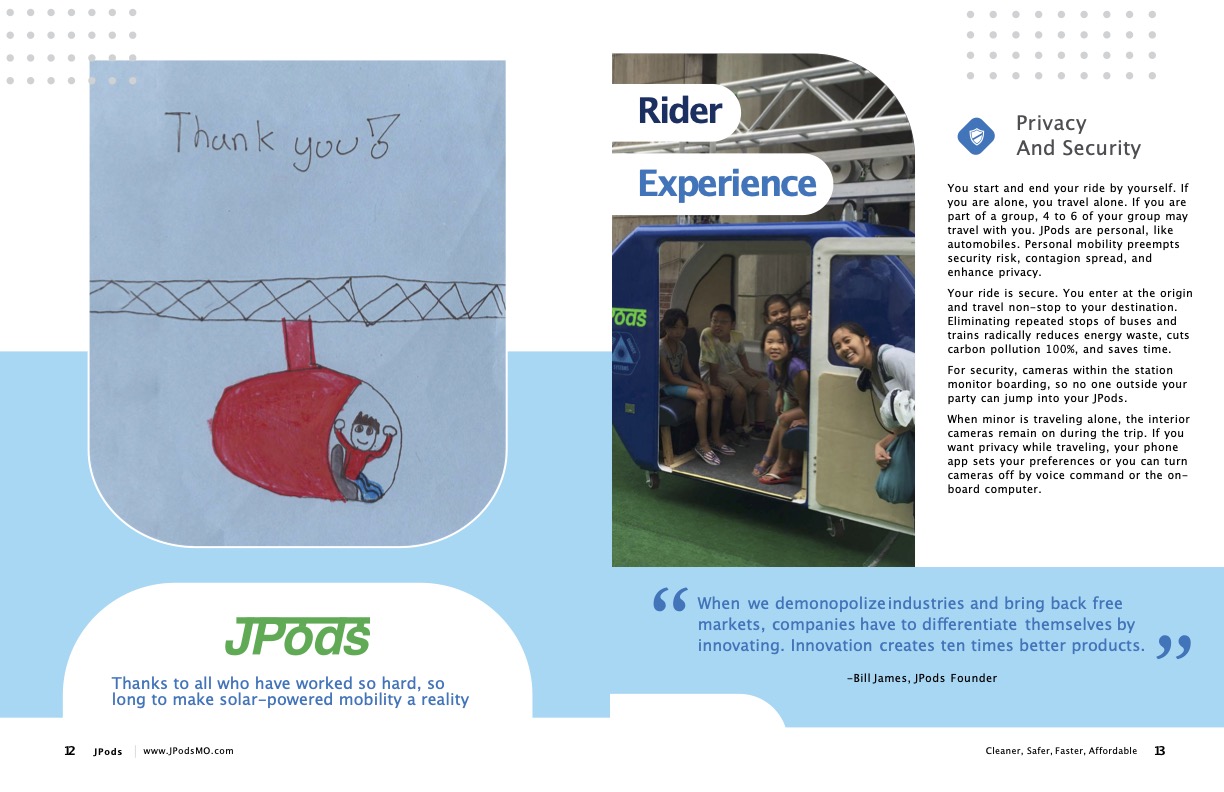
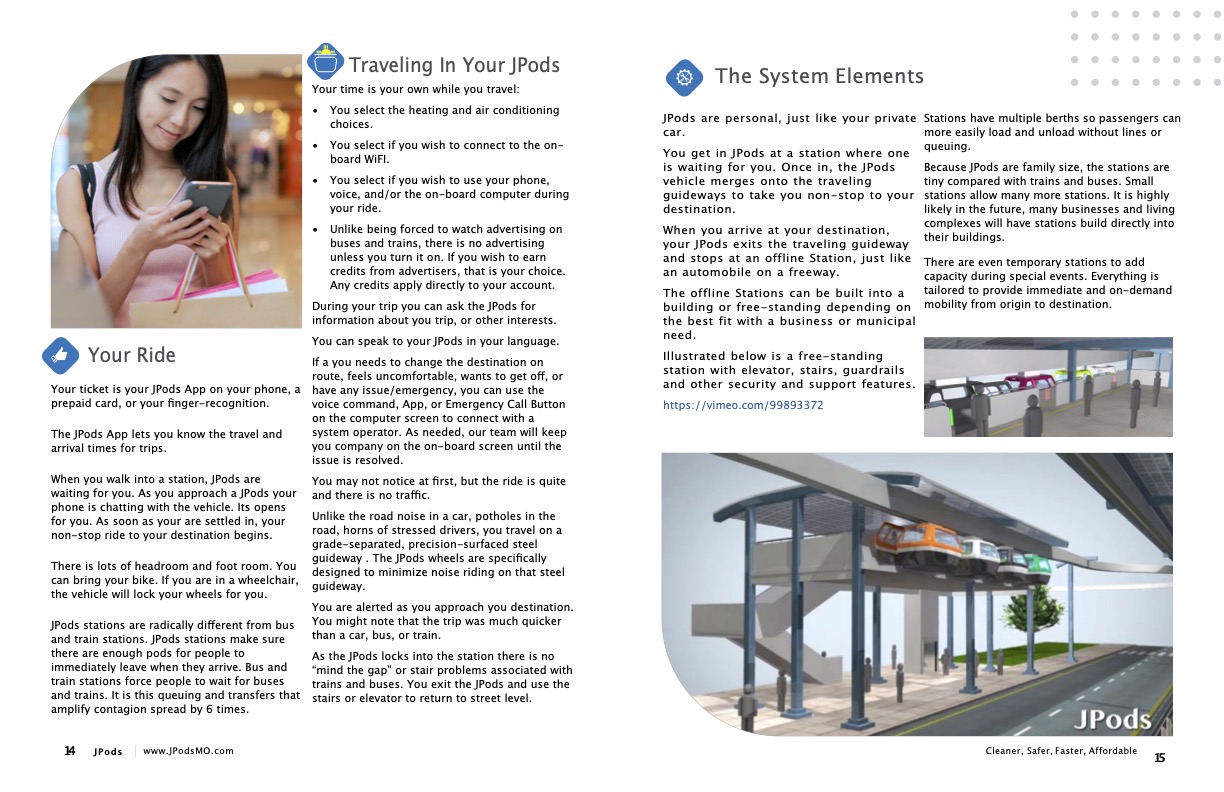

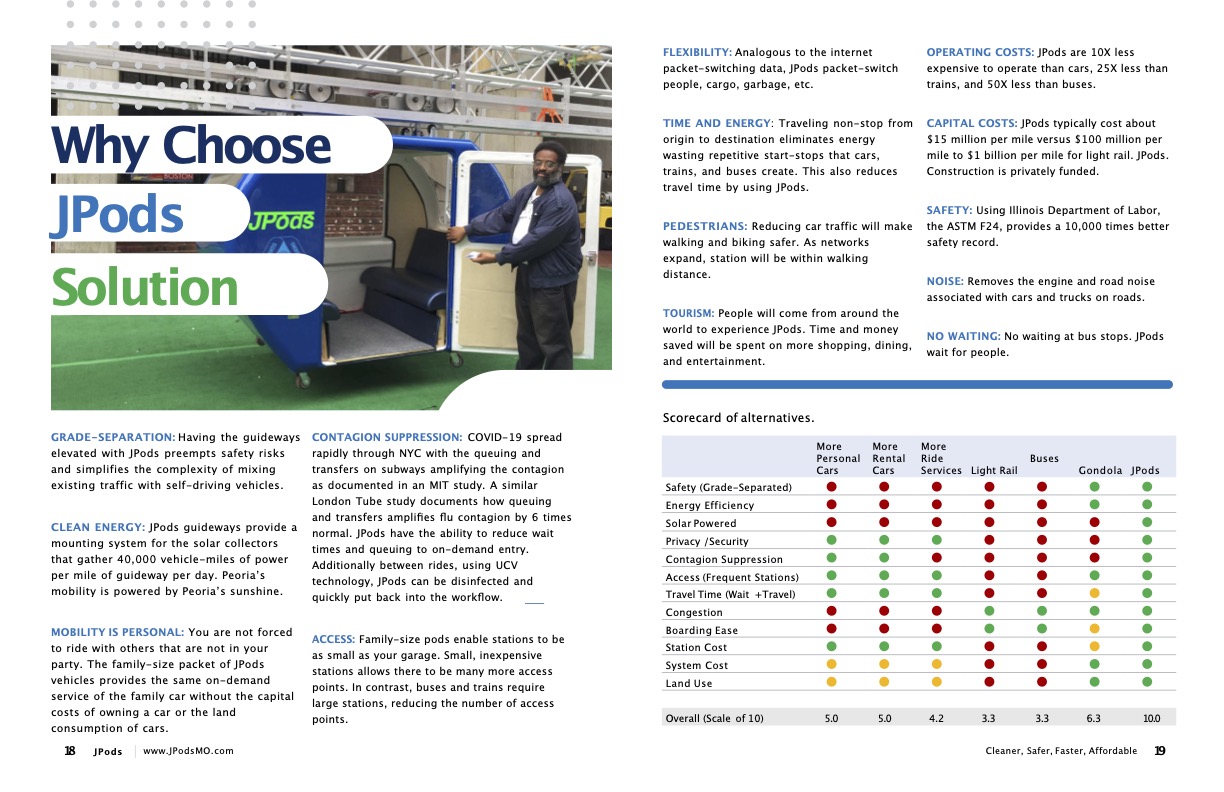


Background
Commerce and Community are Pedestrian:
Only 1.2% of land area in the 35 largest US cities are walkable land and generate 20% of GDP.
JPods grade-separated networks safety support walking and biking.
UnWalkable Cities:
In 1972 the US, Sweden and Denmark had the same per person oil consumption and pedestrian safety record. Following the 1973 Oil Embargo:
- US policies continue sprawl.
- Sweden and Denmark changed highway-centric policies to focus on more walkable and bikeable streets. Per person oil consumption was cut to 60% below the US. Pedestrian and bike rider kill-rates were cut to 400% below US policies.
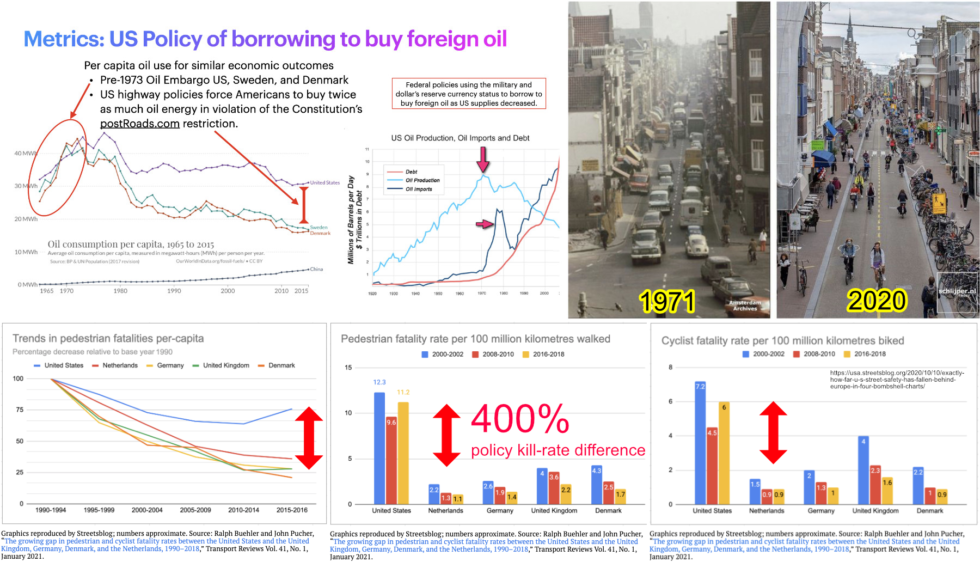
More what is failing, will fail:
Morgantown PRT, half a century of self-driving cars - zero vehicle caused injuries:
Walter Cronkite opens this 1972 coverage of President Nixon's daughter opening the Morgantown PRT with, "One of the big problems in this country is something most of run into every day, traffic jams..." More of what is failing will fail. Commerce and Community are pedestrian. Machines should be grade-separated so they do not create linear barriers to Commerce and Community.
Grade-control of freight railroads allows them to achieve 470 ton-mpg efficiency. Grade-separation of JPods and other PRT networks enables approaching freight railroad efficiencies and achieve the 3,000 times better safety record of theme park thrill rides over highways.
In its half-century of operation, the network caused zero reportable injuries. Highways seriously injure 2.4 million Americans per year. PRT provides an alternative to highways.
History of the Morgantown PRT, Oct 24, 1972 from Bill James on Vimeo.
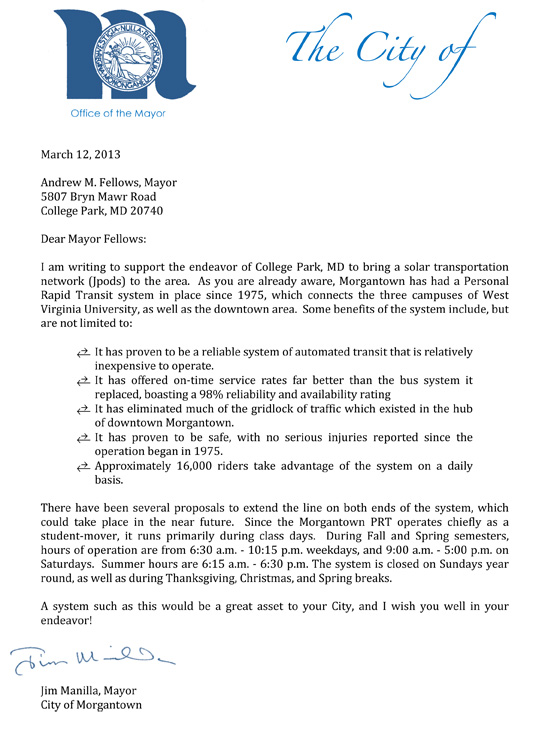
Congressional Study, Automated Guideway Transit, 1975:

This study was published to identify solutions to the 1973 Oil Embargo. Finding were that government “institutional failures” blocked Automated Guideway Transit innovations for “four to six decades (aside from some relatively minor cosmetic changes)… Compared with many other areas of entrepreneurial endeavor, the environment for innovation in transportation should be favorable. Urban transportation needs are extensive… In retrospect, the new systems efforts have served not to stimulate interest in new technology but to discourage already reluctant local transit operators from considering it.”
"Proponents of PRT view this concept as a reasonable supplement to the private automobile in high density urban areas and claim that PRT can provide a very much higher level of service than other modes of public transportation. Thus, it is argued that PRT systems would attract a significant percentage of the rides now being made in private automobiles and offer obvious benefits:
-
- less traffic congestion in urban areas.
- less land and fewer facilities used for automobile storage. . reduced travel time under more comfortable Circumstance. . less noise and air pollution.
- reduction in consumption of petroleum-derived fuels.
- reduction in requirements for new arterial roads and urban freeways.
It is contended that PRT would provide greater mobility for the transportation disadvantaged, i.e., the young, the elderly, the poor, and the handicapped."
Attempts by New Jersey's Legislature to break these "institutional failures":
-
- "c. It is in the State’s economic interest to investigate new types of service which may improve the usefulness and integration of existing platforms, provide fast, inexpensive travel options, reduce capital costs of projects, and reduce pollution from motor vehicle travel. Personal Rapid Transit (hereinafter “PRT”) is one such technology currently being made available."
-
- "d. According to the Federal Transit Administration, average capital cost per two-way mile for heavy rail is $150 million, and for light rail is $70 million. For operating cost per passenger mile: heavy rail is $1.20, light rail is $1.80. However, PRT has the potential to cost 37 much less than heavy and light-rail applications, carry high capacity, be flexibly located, and require much less physical “footprint,” potentially reducing easement impact for currently scheduled projects. PRT studies have shown a capital cost of about one-tenth the cost of existing rail technology, with similarly low operating costs."
-
- New Jersey Legislature Study by BAH 070515 Associated TRB slidedeck.
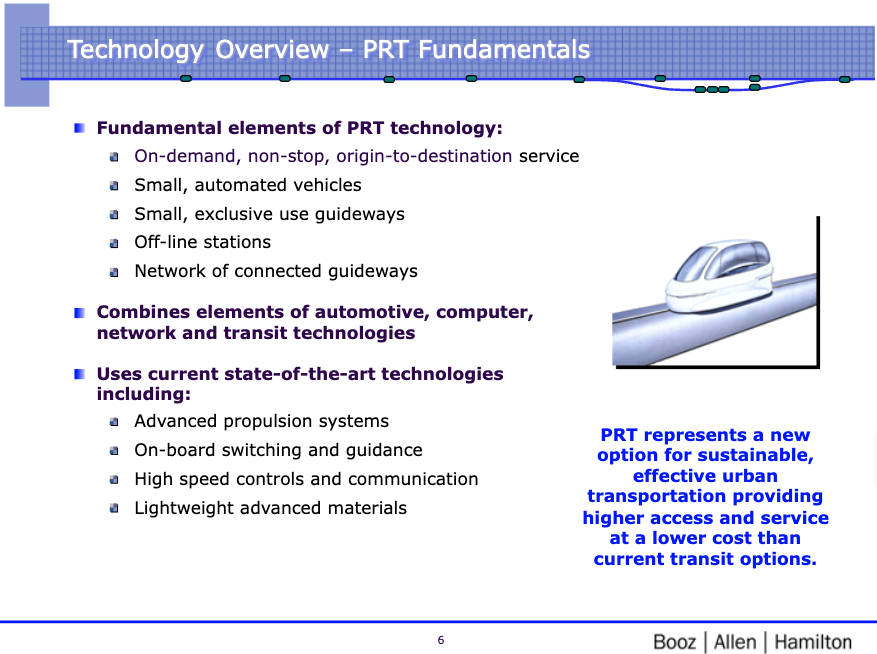
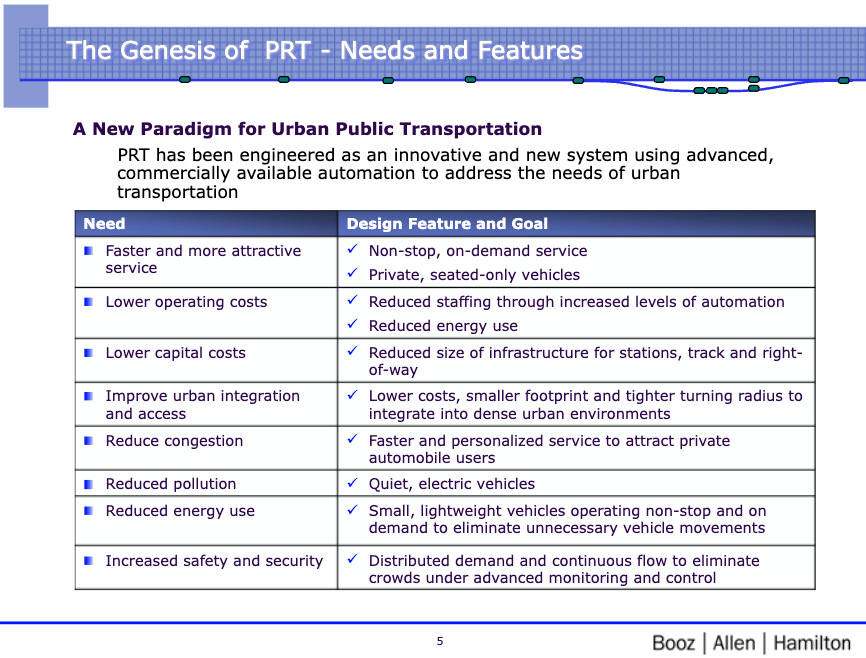
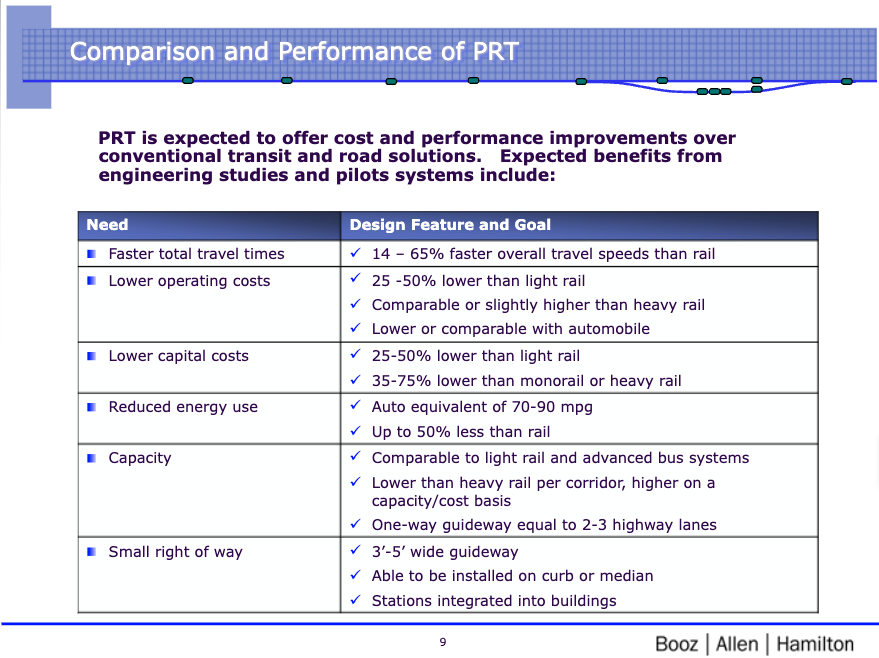

End of Affordable Oil
Without action, it seems the oil price crisis of 2008 will repeat by 2026:
-
- 85% of 153 oil executives agreed with the Dallas Federal Reserve survey question: "Do you expect a significant tightening of the oil market by the end of 2024, given the current underinvestment in exploration?"
-
- Cited comment: “Shale core exhaustion and inventory concerns are mainstream and well-documented issues. Shale will likely tip over in five years, and U.S. production will be down 20 to 30 percent quickly. When it does—this feels like watching the steam roller scene in Austin Powers. Oil prices in the late 2020s will be something to behold.”
Each car costs a family about $9,282, is parked 95% of the time with ~85% of car costs leave the local economy. 2.24 cars per household (278.06 million cars, 124.01 million households)
North Dakota Governor on Strong Towns
